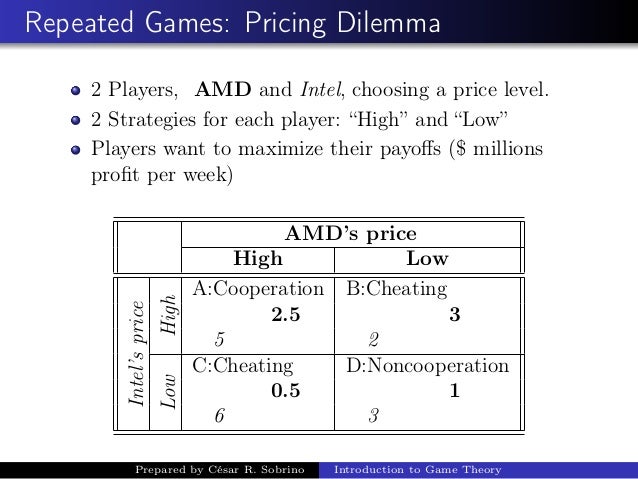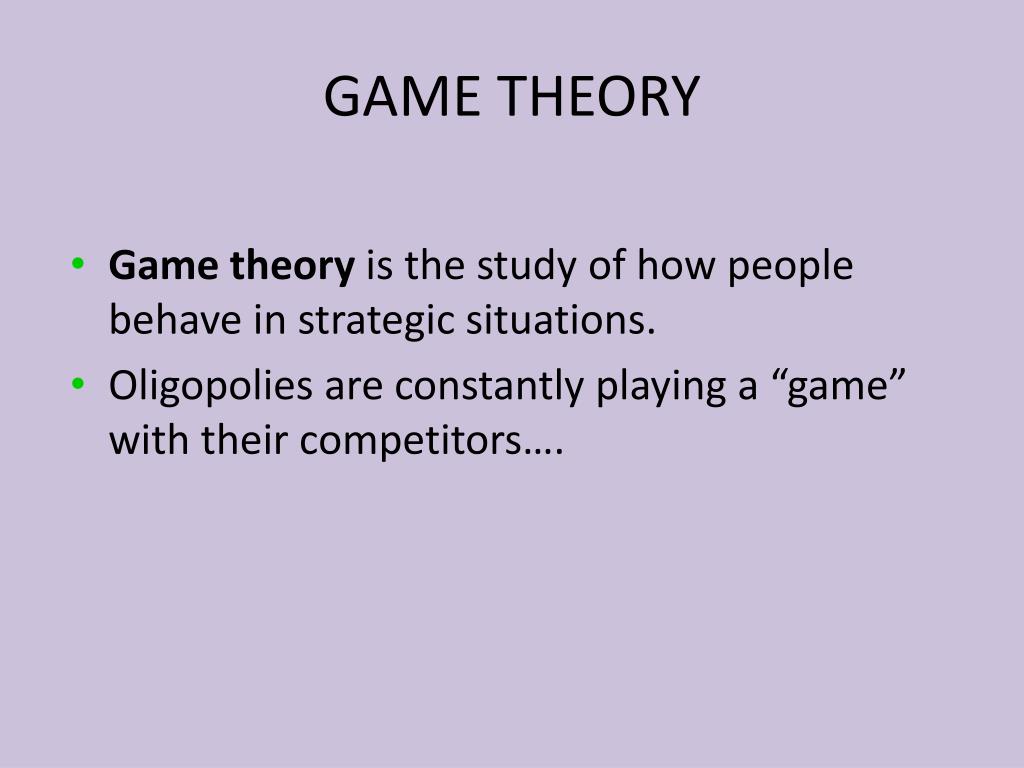How to use cheat engine 6.4 for android games. In order to preserve your self-respect, it is sometimes necessary to lie and cheat.'
The prisoner's dilemma is a specific type of game in game theory that illustrates why cooperation may be difficult to maintain for oligopolists even when it is mutually beneficial. In the game, two members of a criminal gang are arrested and imprisoned. The prisoners are separated and left to contemplate their options. Game Theory and Cheating A controversial blog post from an NYU Stern School professor has been circulating. The original has been removed but it is available here.
I had started to do a series on game theory earlier this year, but stopped when I realized there were some huge knowledge gaps in what I knew. However, in economics this morning, we talked about game theory and specifically what would happen in the prisoner's dilemma if:- the game is played more than once for a finite number of terms (immediately goes to Nash equilibrium)
- the game is played an infinite number of times with a trigger strategy and an interest rate (account for time value of money, TVM)
In the latter, there is a VERY interesting result that appears. https://aboutclever.mystrikingly.com/blog/pokemon-tcg-online-game-cheats. Using the same game matrix as in the original prisoner's dilemma matrix:
The assumption is that both firms will collude until one firm cheats (the 'trigger'). There is also an assumption that the TVM is described by a general 'interest rate', i. You can actually calculate the NPV for each decision matrix and find i (or more accurately in finance terms, IRR) and how that affects the NPV of each decision.For example:

= 10 + 10/(1+i) + 10/(1+i)^2 + 10/(1+i)^3 + ..
= 10 + 10/i
(Note this is EXACTLY the same math lesson I gave at the Analyst Exchange, using perpetuities and sequences and series.)
Similarly
Cheating at any given point has a value to Firm 1 of:
= 15 + 2/(1+i) + 2/(1+i)^2 + 2/(1+i)^3 + ..
Video Game Cheating
= 15 + 2/iUsing basic economic theory regarding alternative choices (or using finance theory as regarding NPV, IRR and investment decisions) you can equate the two formulas to understand how 'cheating' decisions are made. Intuitively, you can see that if i is infinity (or some other astronomically high number), the second term goes away and you are incented to cheat. Another way of saying that is if the TVM is very high (resulting in a high interest rate) you'd rather have the money now (cheat).
However, for lower values of i (low time value of money) you'd prefer to benefit later (co-operate). Let's look at where the firms are indifferent, or:
10 + 10/i = 15 + 2/i
Therefore: i = 1.6 or a monstrous 160%
Cheating Game Game Theory Games
(probably from a bad choice of numbers, or the heavy penalty related to both parties cheating)
Free Game Games

= 10 + 10/(1+i) + 10/(1+i)^2 + 10/(1+i)^3 + ..
= 10 + 10/i
(Note this is EXACTLY the same math lesson I gave at the Analyst Exchange, using perpetuities and sequences and series.)
Similarly
Cheating at any given point has a value to Firm 1 of:
= 15 + 2/(1+i) + 2/(1+i)^2 + 2/(1+i)^3 + ..
Video Game Cheating
= 15 + 2/iUsing basic economic theory regarding alternative choices (or using finance theory as regarding NPV, IRR and investment decisions) you can equate the two formulas to understand how 'cheating' decisions are made. Intuitively, you can see that if i is infinity (or some other astronomically high number), the second term goes away and you are incented to cheat. Another way of saying that is if the TVM is very high (resulting in a high interest rate) you'd rather have the money now (cheat).
However, for lower values of i (low time value of money) you'd prefer to benefit later (co-operate). Let's look at where the firms are indifferent, or:
10 + 10/i = 15 + 2/i
Therefore: i = 1.6 or a monstrous 160%
Cheating Game Game Theory Games
(probably from a bad choice of numbers, or the heavy penalty related to both parties cheating)

